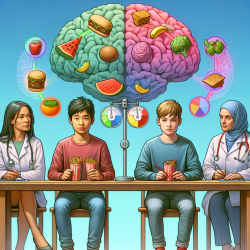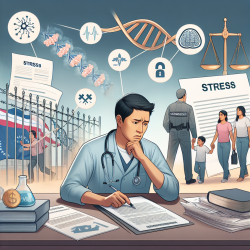Introduction
The concept of food addiction, often compared to substance addiction, has been gaining traction in recent years. Particularly in adolescents, understanding the psychosocial factors associated with food addiction can be crucial for practitioners aiming to improve therapeutic outcomes. A recent study titled "Psychosocial Correlates of Food Addiction and Its Association with Quality of Life in a Non-Clinical Adolescent Sample" sheds light on these associations and provides valuable insights for practitioners.
Key Findings from the Study
The study investigated the prevalence of food addiction in a non-clinical sample of Chinese adolescents and examined its associations with psychosocial factors and quality of life (QoL). Here are some key findings:
- The prevalence of food addiction was found to be 6.91% among the adolescents studied.
- Food addiction was significantly associated with higher levels of depression, lower self-esteem, and increased feelings of loneliness.
- Adolescents with food addiction reported lower overall QoL and psychosocial health-related QoL.
Implications for Practitioners
For practitioners working with adolescents, these findings highlight the importance of addressing psychosocial factors in therapeutic interventions. Here are some practical steps practitioners can take:
- Screen for Psychosocial Issues: Regularly screen adolescents for depression, low self-esteem, and loneliness, as these are strongly associated with food addiction.
- Holistic Approach: Incorporate strategies that address both emotional and social aspects of the adolescent's life to improve their overall QoL.
- Education and Awareness: Educate adolescents and their families about the potential impact of food addiction on mental health and quality of life.
- Encourage Healthy Eating Behaviors: Develop programs that promote healthy eating habits and address the emotional triggers that may lead to addictive eating behaviors.
Encouraging Further Research
While this study provides valuable insights, it also opens up avenues for further research. Practitioners are encouraged to explore the following areas:
- Longitudinal studies to better understand the causal relationships between food addiction and psychosocial factors.
- Investigating the role of other potential factors such as family dynamics and peer influence in the development of food addiction.
- Exploring intervention strategies that can effectively address food addiction and improve QoL in adolescents.
Conclusion
Understanding the psychosocial correlates of food addiction in adolescents is crucial for developing effective interventions. By integrating these insights into practice, practitioners can enhance the quality of life for adolescents struggling with food addiction. For a deeper understanding, practitioners are encouraged to delve into the original research paper.
To read the original research paper, please follow this link: Psychosocial Correlates of Food Addiction and Its Association with Quality of Life in a Non-Clinical Adolescent Sample.










